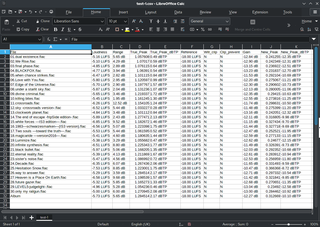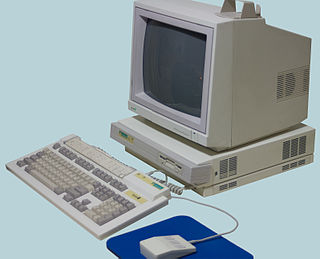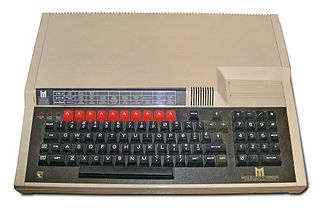
The Acorn Electron was introduced as a lower-cost alternative to the BBC Micro educational/home computer, also developed by Acorn Computers, to provide many of the features of that more expensive machine at a price more competitive with that of the ZX Spectrum. It has 32 kilobytes of RAM, and its ROM includes BBC BASIC II together with the operating system. Announced in 1982 for a possible release the same year, it was eventually introduced on 25 August 1983 priced at £199.

Microsoft Excel is a spreadsheet editor developed by Microsoft for Windows, macOS, Android, iOS and iPadOS. It features calculation or computation capabilities, graphing tools, pivot tables, and a macro programming language called Visual Basic for Applications (VBA). Excel forms part of the Microsoft 365 and Microsoft Office suites of software and has been developed since 1985.

A spreadsheet is a computer application for computation, organization, analysis and storage of data in tabular form. Spreadsheets were developed as computerized analogs of paper accounting worksheets. The program operates on data entered in cells of a table. Each cell may contain either numeric or text data, or the results of formulas that automatically calculate and display a value based on the contents of other cells. The term spreadsheet may also refer to one such electronic document.
BBC BASIC is an interpreted version of the BASIC programming language. It was developed by Acorn Computers Ltd when they were selected by the BBC to supply the computer for their BBC Literacy Project in 1981.

The Acorn Archimedes is a family of personal computers designed by Acorn Computers of Cambridge, England. The systems in this family use Acorn's own ARM architecture processors and initially ran the Arthur operating system, with later models introducing RISC OS and, in a separate workstation range, RISC iX. The first Archimedes models were introduced in 1987, and systems in the Archimedes family were sold until the mid-1990s alongside Acorn's newer Risc PC and A7000 models.

The Acorn Atom is a home computer made by Acorn Computers Ltd from 1980 to 1982, when it was replaced by the BBC Micro. The BBC Micro began life as an upgrade to the Atom, originally known as the Proton.

Elite is a space trading video game. It was written and developed by David Braben and Ian Bell and was originally published by Acornsoft for the BBC Micro and Acorn Electron computers in September 1984. Elite's open-ended game model, and revolutionary 3D graphics led to it being ported to virtually every contemporary home computer system and earned it a place as a classic and a genre maker in gaming history. The game's title derives from one of the player's goals of raising their combat rating to the exalted heights of "Elite".
Acornsoft was the software arm of Acorn Computers, and a major publisher of software for the BBC Micro and Acorn Electron. As well as games, it also produced a large number of educational titles, extra computer languages and business and utility packages – these included word processor VIEW and the spreadsheet ViewSheet supplied on ROM and cartridge for the BBC Micro/Acorn Electron and included as standard in the BBC Master and Acorn Business Computer.

The BBC Domesday Project was a partnership between Acorn Computers, Philips, Logica, and the BBC to mark the 900th anniversary of the original Domesday Book, an 11th-century census of England. It has been cited as an example of digital obsolescence on account of the physical medium used for data storage.

The BBC Master is a home computer released by Acorn Computers in early 1986. It was designed and built for the British Broadcasting Corporation (BBC) and was the successor to the BBC Micro Model B. The Master 128 remained in production until 1993.
The Acorn Business Computer (ABC) was a series of microcomputers announced at the end of 1983 by the British company Acorn Computers. The series of eight computers was aimed at the business, research and further education markets. Demonstrated at the Personal Computer World Show in September 1984, having been under development for "about a year" and having been undergoing field trials from May 1984, the range "understandably attracted a great deal of attention" and was favourably received by some commentators. The official launch of the range was scheduled for January 1985.
In computing, caret navigation is a kind of keyboard navigation where a caret is used to navigate within a text document.

The Machine Operating System (MOS) or OS is a discontinued computer operating system (OS) used in Acorn Computers' BBC computer range. It included support for four-channel sound, graphics, file system abstraction, and digital and analogue input/output (I/O) including a daisy-chained expansion bus. The system was single-tasking, monolithic and non-reentrant.

Snapper is a clone of the Namco arcade game Pac-Man programmed by Jonathan Griffiths for the BBC Micro and released as one of the launch titles for Acornsoft in 1982. It was also one of Acornsoft's launch titles for the Acorn Electron in 1983.

A BBC Micro expansion unit, for the BBC Micro is one of a number of peripherals in a box with the same profile and styling as the main computer.
Positron is a fixed shooter written by Gary Partis for the BBC Micro and Acorn Electron and published by Micro Power in 1983. It was developed on a pre-release Electron and was one of the few games available for the machine on its launch.

The BBC Microcomputer System, or BBC Micro, is a series of microcomputers designed and built by Acorn Computers Limited in the 1980s for the Computer Literacy Project of the BBC. The machine was the focus of a number of educational BBC TV programmes on computer literacy, starting with The Computer Programme in 1982, followed by Making the Most of the Micro, Computers in Control in 1983, and finally Micro Live in 1985.
The Samsung SGH-i907, marketed as the Samsung Epix in the United States by AT&T Wireless, is a Windows Mobile-based quad-band GSM smartphone manufactured by Samsung.

Acornsoft LISP is a dialect and commercial implementation of the Lisp programming language, released in the early 1980s for the 8-bit Acorn Atom, BBC Micro and Acorn Electron computers.
Wordwise is a word processor program published in 1981. It was the best selling word processor in the UK for the BBC Microcomputer during the 1980–1990 time period. The program was supplied on an 8K ROM, and was published by Computer Concepts. The use of ROM allowed the entire RAM of the host machine to be used for storing and manipulating the text, and providing printer-buffer functionality.












